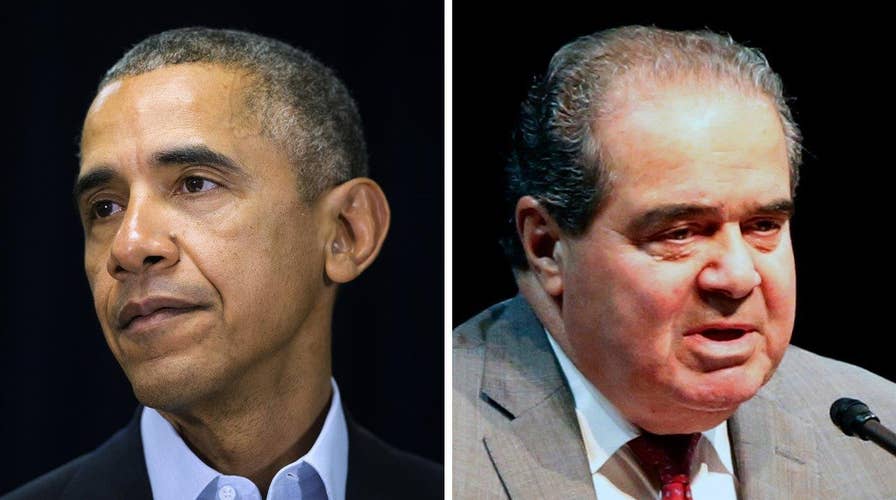President Obama to skip Justice Scalia's funeral
Legal analyst Peter Johnson Jr. reacts on 'Fox & Friends'
Congress and the White House are gearing up for what could be a protracted fight over the shaky ideological balance of a mostly conservative Supreme Court, as President Obama prepares to nominate a replacement for the late Justice Antonin Scalia.
But, whether a successor is confirmed this year or next, the 113th justice by most measures will have a tough act to follow -- as he or she seeks to navigate the complex dynamics of a divided bench, and gain some measure of the influence and public acclaim Scalia enjoyed for nearly three decades on the bench.
Current and former Obama administration officials quietly acknowledge the desire to excite progressives in an election year with an outspoken justice willing to take on the right, a "Scalia of the Left."
He or she will be hard to find. Scalia, in a sense, will be irreplaceable.
His iconic legacy on and off the bench may serve as a lesson for future presidents considering a nominee who will have an influence long after the executive -- and the justice himself – leaves.
On most of the major hot-button issues of his day, Scalia tilted right: against abortion, which he believed was not a right guaranteed under the Constitution, but a political issue to be decided by the other branches. He supported use of the death penalty, gun rights, state rights, and executive authority. He held tight to his views and never compromised for sake of consensus or internal harmony.
Court sources say he grew frustrated over the years being on the losing side of many cases, or not being able to write the majority opinion. Yet through speeches and books, Scalia developed a cult following of sorts among young conservatives, a gleeful swashbuckler with his ideological opponents.
“To thine own self be true," was a favorite mantra of Justice Scalia, a man both respected and dismissed, feared and feted -- a personality combining equal amounts of levity and judicial heft.
"The real impact is to have a justice on the court that had such a clear intellectual vision of the Constitution, and the role of a justice," said Paul Clement, a former Scalia clerk, who has argued more than 40 cases before the justices. "And like it or hate it, it was hard to ignore him and that will be his real legacy coming forward."
Going forward, Obama is ignoring Republican threats to block whomever he chooses, and vowing to tap a nominee in “due time.”
Short-term considerations drive much of the politics over who the nominee will and should be. Many progressives treat the vacancy as an unexpected "gift" for Obama to firmly move the court to the left for the first time in decades, and they will urge him to name a forceful advocate for the left.
"We are confident that the president will nominate someone who understands the lives and struggles of everyday Americans," said Nan Aron, president of Alliance for Justice. "And trust that that the Supreme Court will not become a casualty of the politics of destruction, denial, and obstruction."
Leaders from the Progressive Change Campaign Committee and MoveOn.org insisted Wednesday they are seeing a surge in voter interest and enthusiasm over the Senate Republican leadership's stance on a nominee to replace Scalia.
But conservatives say Republican senators will be able to convince Americans that putting off a confirmation until next year is true democracy in action.
“On both sides of the aisle the voters are in revolt. Isn't this an even more important opportunity to ask Americans what values they want the court to reflect?" said Carrie Severino, chief counsel of the Judicial Crisis Network. "The constitutional follies of this administration -- from Obamacare to his executive power grabs -- were what gave Republicans control of the Senate in 2014."
The late liberal lion, Justice William Brennan, was noted for saying the most important number at the court was "five," the votes needed to command a majority on the nine-member (or current eight-member) bench. Such practical concerns also figure in the White House calculus over whether their nominee will pass Senate muster, without fear of a filibuster. A so-called "consensus" pick may be the safest option in a volatile election year, but perhaps unlikely in the heat of the moment to please either the rhetorical right or the left.
Still, many of Obama’s federal judicial nominees thus far have been non-controversial, center-left candidates. Some liberal activists say the president may be inclined to go the same route, choosing a nominee who will be spared a bruising confirmation.
The White House indicated Wednesday it had reached out to senators from both parties for their input into the nomination, indicating at least a show of inclusion into the process.
For their part, many conservative activists would not mind a fight, and their early rhetoric suggests they anticipate one.
"While President Obama remains free to appoint a conservative committed to upholding the Constitution as his replacement, he has given us no reason to believe he would," said Jay Sekulow, chief counsel of the American Center for Law and Justice. "So the American people should get to decide."





